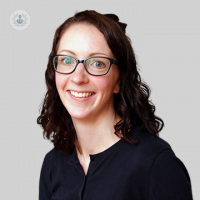Are all breast cancer patients suitable for hormone therapy?
Written in association with:In this article here, Dr Claire Baldry, a distinguished and experienced consultant clinical oncologist, details what hormone therapy is, and tells us how exactly it is used to treat breast cancer in men and women.

What is hormone therapy, and how can it be used to treat breast cancer?
Many breast cancers have receptors for the hormone oestrogen within the cancer. Oestrogen can cause breast cancers to grow and divide. Women, before menopause, produce oestrogen from their ovaries, as do men and post-menopausal women.
Hormone treatment can be used for pre-menopausal women, post-menopausal women, and men with breast cancer when that cancer contains these oestrogen receptors. Around 80 to 85 per cent of breast cancers express that. Hormone treatment is usually given as a tablet and is taken to either reduce the oestrogen levels in the body or to prevent the cancer from using that oestrogen to grow and divide.
What advantages does hormone therapy have compared to other forms of treatment?
Hormone treatments can be used by themselves when other forms of treatment are not necessary. It is often used in conjunction with chemotherapy to reduce the chances of breast cancer recurring.
Hormone therapy can be particularly useful in patients who do not need chemotherapy or who have limited fitness to undergo chemotherapy. Hormone therapy is also a very good treatment used in conjunction with other drugs for patients who have developed metastatic disease, and it can delay the need for chemotherapy in that setting.
Hormone therapy is generally very easy to take, and although it does have some side effects, they are much less severe and less intense compared to the side effects of other cancer treatments.
Are there any disadvantages or limitations? Are all breast cancer patients suitable for it?
Like every treatment, there are some side effects. Some commonly reported side effects include sweats or hot flushes, as well as aches and pains in bones and joints. Patients who undergo hormone therapy are also at a slightly higher risk of suffering blood clots.
Hormone therapy is only suitable for patients who have oestrogen receptive positive cancer and is not effective in patients who do not have this feature.
How is it administered?
Hormone treatment is probably one of the most straightforward cancer treatments to administer. For most patients, we simply give a prescription of tablets to be taken once a day. It is best taken at the same time of day, but there is some flexibility with that.
There are no particular monitoring requirements when hormone therapy is given by itself, apart from the need for bone density scans in some patients. If it is given in conjunction with other treatments, they will need occasional blood tests, but this is to monitor the other treatments, and not hormone treatment.
What are the success rates of hormone therapy for breast cancer?
When hormone treatment is used after surgery to reduce the risk of cancer recurring, it is extremely successful in reducing the rates of cancer coming back, either in the breast or somewhere else in the body.
We typically see that patients feel the full benefit of hormone treatment long after the treatment has stopped. We now know that the survival for breast cancer for women and men who receive hormone treatment is significantly better when compared to those who have not received it.
Dr Claire Baldry is a highly esteemed consultant clinical oncologist who specialises in breast cancer diagnosis and treatment. If you would like to book a consultation with her, you can do so today via her Top Doctors profile.



